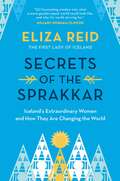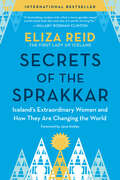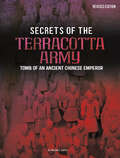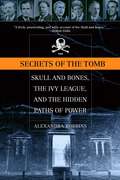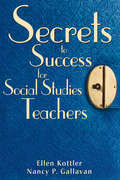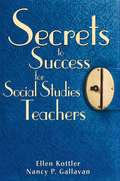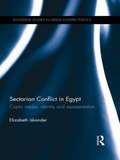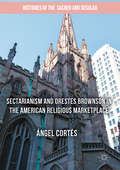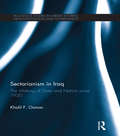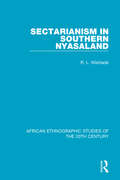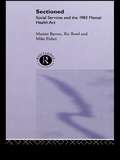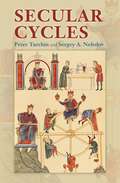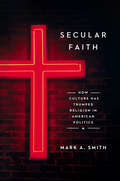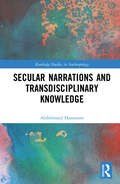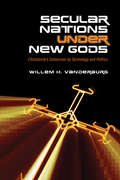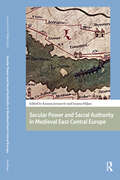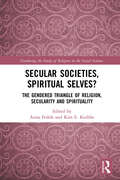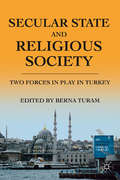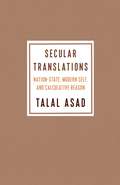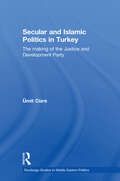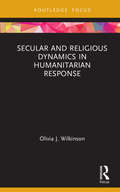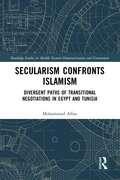- Table View
- List View
Secrets of the Lost Symbol: The Unauthorised Guide to the Mysteries Behind The Da Vinci Code Sequel
by Sean Barrett Dan Burstein Arne de KeijzerDelve into a whole new world of secret societies, ancient mysteries, hidden symbols, new-age philosophy and cutting-edge science... Discover: the role the Freemasons played in US history; the 'real' Katherine Solomon; the true background of the 'Ancient Mysteries'; the reality of Noetic science and much more...Presenting ideas from world renowned historians, code-breakers, symbologists, theologians, philosophers and scientists, Burstein and de Keijzer break through the web of conspiracies, mythologies, encrypted signs and alternate histories.SECRETS OF THE LOST SYMBOL is a must-read for anyone who wants to separate reality, speculation, fact and fiction in Dan Brown's global phenomenon.Read by Sean Barrett(p) 2010 Orion Publishing Group
Secrets of the Nanny Whisperer
by Tammy GoldThe New Childcare Bible—A Must-Have Whether You Have Occasional Sitters or a Full-Time Nanny Finding the right caregiver can be one of the most life-changing decisions a parent makes. Whether it's a kindly neighbor for the weekday latchkey hours, a teenage babysitter one night a week, or a full-time professional nanny, the right caregiver can enrich a child's world and literally grow her brain. Hire the wrong one, and this person could cause developmental delays and stress for the entire family. In her groundbreaking new book, Secrets of the Nanny Whisperer: A Practical Guide for Finding and Achieving the Gold Standard of Care for Your Child, nationally recognized parenting expert Tammy Gold draws from her extensive background in child developmental psychology, social work, and family therapy to offer the first childcare bible for parents. Knowing the impact caregivers have on children coupled with the unregulated often unknown world of in-home childcare workers, Gold has devoted her professional career, and now this book, to helping parents navigate through this important--and woefully overlooked--process. She arms parents with invaluable tools, tips, and insider secrets to finding the perfect caregiver-family match. Gold's Family Needs Assessment helps parents identify the traits and conditions that are "must-haves," added "pluses," or nonnegotiable "deal breakers. " Parents can then use this list of qualities to quickly weed out unqualified candidates. She also details what to ask over the phone and in a face-to-face interview, how to structure a trial run (which she deems essential), and what to spell out in a Nanny-Family Work Agreement--another essential tool included in the book. Readers learn her "Nanny Speak 1-2-3" technique to help clarify and resolve issues with the caregiver in a productive, positive way. In addition to saving hours and energy, Parents will also discover as much about parenting as they will about finding a nanny. Secrets of the Nanny Whisperer is chock-full of parenting gems about children's developmental stages, ways to nurture and stimulate the child, and essential strategies for maintaining harmonious and high-functioning parent-child-caregiver relationships. This book is a must read for parents who want to create a happier, healthier and safer childcare experience for their child.
Secrets of the Sprakkar: Iceland's Extraordinary Women and How They Are Changing the World
by Eliza ReidThe Canadian first lady of Iceland pens a book about why this tiny nation is leading the charge in gender equality, in the vein of The Moment of Lift.Iceland is the best place on earth to be a woman—but why? For the past twelve years, the World Economic Forum&’s Global Gender Gap Report has ranked Iceland number one on its list of countries closing the gap in equality between men and women. What is it about Iceland that enables its society to make such meaningful progress in this ongoing battle, from electing the world&’s first female president to passing legislation specifically designed to help even the playing field at work and at home? The answer is found in the country&’s sprakkar, an ancient Icelandic word meaning extraordinary or outstanding women. Eliza Reid—Canadian born and raised, and now first lady of Iceland—examines her adopted homeland&’s attitude toward women: the deep-seated cultural sense of fairness, the influence of current and historical role models, and, crucially, the areas where Iceland still has room for improvement. Throughout, she interviews dozens of sprakkar to tell their inspirational stories, and expertly weaves in her own experiences as an immigrant from small-town Canada. The result is an illuminating discussion of what it means to move through the world as a woman and how the rules of society play more of a role in who we view as equal than we may understand. What makes many women&’s experiences there so positive? And what can we learn about fairness to benefit our society? Like influential and progressive first ladies Eleanor Roosevelt, Hillary Rodham Clinton, and Michelle Obama, Reid uses her platform to bring the best of her nation to the world. Secrets of the Sprakkar is a powerful and atmospheric portrait of a tiny country that could lead the way forward for us all.
Secrets of the Sprakkar: Iceland's Extraordinary Women and How They Are Changing the World
by Eliza ReidTHE INTERNATIONAL BESTSELLER!"Secrets of the Sprakkar is a fascinating window into what a more gender-equal world could look like, and why it's worth striving for. Iceland is doing a lot to level the playing field: paid parental leave, affordable childcare, and broad support for gender equality as a core value. Reid takes us on an exploration not only around this fascinating island, but also through the triumphs and stumbles of a country as it journeys towards gender equality."—Hillary Rodham ClintonIceland is the best place on earth to be a woman—but why?For the past twelve years, the World Economic Forum's Global Gender Gap Report has ranked Iceland number one on its list of countries closing the gap in equality between men and women. What is it about Iceland that makes many women's experience there so positive? Why has their society made such meaningful progress in this ongoing battle, from electing the world's first female president to passing legislation specifically designed to help even the playing field at work and at home? And how can we learn from what Icelanders have already discovered about women's powerful place in society and how increased fairness benefits everyone?Eliza Reid, the First Lady of Iceland, examines her adopted homeland's attitude toward women—the deep-seated cultural sense of fairness, the influence of current and historical role models, and, crucially, the areas where Iceland still has room for improvement. Reid's own experience as an immigrant from small-town Canada who never expected to become a first lady is expertly interwoven with interviews with dozens of sprakkar ("extraordinary women") to form the backbone of an illuminating discussion of what it means to move through the world as a woman, and how the rules of society play more of a role in who we view as "equal" than we may understand. Secrets of the Sprakkar is a powerful and atmospheric portrait of a tiny country that could lead the way forward for us all.
Secrets of the Terracotta Army: Tomb of an Ancient Chinese Emperor (Archaeological Mysteries)
by Michael CapekDig through the fields of the far East to unearth the huge clay army of China's first emperor. Why were the thousands of life sized statues built? How were they designed with such intricate detail? Travel along with scientists to find out how the Terracotta Armys discovery sheds light on mysteries from ancient China. Unlocking the secrets of the past is just an artifact away!
Secrets of the Tomb: Skull and Bones, the Ivy League, and the Hidden Paths of Power
by Alexandra RobbinsThe cloak-and-dagger secrecy of Yale University's secret society known as Skull and Bones has prompted people worldwide to attribute to it some of the most staggering conspiracies in modern history. From the society's neaarly windowless crypt in the middle of the Yale campus, the Bonesmen, it is said, plot to dominate the world. In this widely acclaimed book, Alexandra Robbins slips through the veil of myth to reveal the truth about Skull and Bones' operations and influence, and explains why this old-boy 19th century throwback still thrives in 21st-century America.
Secrets of the Widow's Son
by Dan Burstein David A ShugartsA dazzling speculative inquiry into the mysteries surrounding the sequel to THE DA VINCI CODESECRETS OF THE WIDOW'S SON is itself an unprecedented book concept. Relying on extensive investigative reporting and intellectual sleuthing, it is an explorer's field guide to understanding the main themes, ideas, symbols and historical issues which author Dan Brown will most likely utilise in THE SOLOMON KEY - months before this much-awaited sequel to THE DA VINCI CODE is even published.SECRETS OF THE CODE told the story of how the riddle embedded in The Da Vinci Code's dust-cover pointed to Dan Brown's next book: selected letters appearing on the book jacket's flaps, slightly bolder than others, spelled out the mystically alluring question, 'Is There No Help for the Widow's Son?' Research led David Shugarts and his team to understand the role of the 'Widow's Son' in the history of Freemasonry, biblical apocrypha, Mormonism, and various secret societies and occult belief systems. Dan Brown has since confirmed that his next book is indeed about the Masons, and that protagonist Robert Langdon, of DA VINCI CODE and ANGELS AND DEMONS fame, would be back to lead us on a symbolic treasure hunt through the art, architecture and secret codes of the American capital, Washington DC.This book is not a plot spoiler for THE SOLOMON KEY. It is not trying to guess who will be murdered, or which fictional mysteries, cover-ups, and conspiracies will be invented to drive the plot of this story. SECRETS OF THE WIDOW'S SON is about the ideas and issues that will form the background and context for THE SOLOMON KEY.
Secrets to Success for Social Studies Teachers
by Ellen Kottler Nancy P. GallavanProvides novice, preservice, and experienced teachers with guidelines for best practices, social studies standards, and the most practical elements of pedagogy, plus invaluable advice from veteran educators.
Secrets to Success for Social Studies Teachers
by Ellen Kottler Nancy P. GallavanUsing their proven formula for guiding novice, pre-service, and experienced teachers, the authors synthesize real-world insights and the most practical elements of pedagogy to provide a ready-to-use resource of best classroom practices. Based on the authors' experience as teacher educators and skilled social studies teachers, this text helps practitioners: * Make instruction meaningful * Develop literacy to build social studies skills * Incorporate district expectations and state standards * Create a community of learners * Collaborate with colleagues The authors provide easy-to-follow lists, tips, and sample forms and letters to help teachers organize their daily work and reduce stress.
Sectarian Conflict in Egypt: Coptic Media, Identity and Representation (Routledge Studies in Middle Eastern Politics)
by Elizabeth IskanderIn light of the Egyptian uprising in early 2011, understanding the dynamics that are shaping Egyptian politics and society is more crucial than ever as Egypt seeks to re-define itself after the Mubarak era. One of the most controversial debates concerns the place of religion in Egypt’s political future. This book examines the escalation in religious violence in Egypt since 2005 and the public discourses behind it, revealing some of the complex negotiations that lie behind contestations of citizenship, Muslim-Christian relations and national unity. Focusing on Egypt’s largest religious minority group, the Coptic Orthodox Christians, this book explores how national, ethnic and religious expressions of identity are interwoven in the narratives and usage of the press and Internet. In doing so it offers insights into some of Egypt’s contemporary social and political challenges, and recognises the ways that media are involved in constructing and reflecting formations of identity politics. The author examines in depth the processes through which identity and belonging are negotiated via media discourses within the wider framework of changing political realities in Egypt. Using a combination of methodological approaches - including comprehensive surveys and content analysis - the research offers a fresh perspective on the politics of identity in Egypt.
Sectarianism and Orestes Brownson in the American Religious Marketplace
by Ángel CortésThis book reveals the origins of the American religious marketplace by examining the life and work of reformer and journalist Orestes Brownson (1803-1876). Grounded in a wide variety of sources, including personal correspondence, journalistic essays, book reviews, and speeches, this work argues that religious sectarianism profoundly shaped participants in the religious marketplace. Brownson is emblematic of this dynamic because he changed his religious identity seven times over a quarter of a century. Throughout, Brownson waged a war of words opposing religious sectarianism. By the 1840s, however, a corrosive intellectual environment transformed Brownson into an arch religious sectarian. The book ends with a consideration of several explanations for Brownson’s religious mobility, emphasizing the goad of sectarianism as the most salient catalyst for change.
Sectarianism in Iraq: The Making of State and Nation Since 1920 (Routledge Studies in Middle Eastern Democratization and Government)
by Khalil OsmanThis book links sectarianism in Iraq to the failure of the modern nation-state to resolve tensions between sectarian identities and concepts of unified statehood and uniform citizenry. After a theoretical excursus that recasts the notion of primordial identity as a socially constructed reality, the author sets out to explain the persistence of sectarian affiliations in Iraq since its creation following the dismemberment of the Ottoman Empire. Despite the adoption of homogenizing state policies, the uneven sectarian composition of the ruling elites nurtured feelings of political exclusion among marginalized sectarian groups, the Shicites before 2003 and the Sunnis in the post-2003 period. The book then examines how communal discourses in the educational curriculum provoked masked forms of resistance that sharpened sectarian consciousness. Tracing how the anti-Persian streak in the nation-state’s Pan-Arab ideology, which camouflaged anti-Shicism, undermined Iraq’s national integration project, Sectarianism in Iraq delves into the country’s slide from a totalizing Pan-Arab ideology in the pre-2003 period toward the atomistic impulse of the federalist debate in the post-2003 period. Employing extensive fieldwork, this book sheds light on the dynamics of political life in post-Saddam Iraq and is essential reading for Iraqi and Middle East specialists, as well as those interested in understanding the current heightening of sectarian Sunni-Shicite tensions in the Middle East.
Sectarianism in Southern Nyasaland
by R. L. WishladeOriginally published in 1965, this is a study of Christian secessionist sects in the southern Province of Nyasaland (Malawi). It discusses the nature and context of sectarianism in Africa and analyses the developemnt of the sects, their ritual and worship and the roles of their officials in the social life of the community. This detailed analysis of the character and influence of sectarianism provides a valuable contirbution t the understanding of the complex process of social change which has taken place in this part of Africa.
Sectioned: Social Services and the 1983 Mental Health Act
by Franz BrentanoFirst published in 1990. Routledge is an imprint of Taylor & Francis, an informa company.
Secular Cycles
by Peter Turchin Sergey A. NefedovMany historical processes exhibit recurrent patterns of change. Century-long periods of population expansion come before long periods of stagnation and decline; the dynamics of prices mirror population oscillations; and states go through strong expansionist phases followed by periods of state failure, endemic sociopolitical instability, and territorial loss. Peter Turchin and Sergey Nefedov explore the dynamics and causal connections between such demographic, economic, and political variables in agrarian societies and offer detailed explanations for these long-term oscillations--what the authors call secular cycles. Secular Cycles elaborates and expands upon the demographic-structural theory first advanced by Jack Goldstone, which provides an explanation of long-term oscillations. This book tests that theory's specific and quantitative predictions by tracing the dynamics of population numbers, prices and real wages, elite numbers and incomes, state finances, and sociopolitical instability. Turchin and Nefedov study societies in England, France, and Russia during the medieval and early modern periods, and look back at the Roman Republic and Empire. Incorporating theoretical and quantitative history, the authors examine a specific model of historical change and, more generally, investigate the utility of the dynamical systems approach in historical applications. An indispensable and groundbreaking resource for a wide variety of social scientists, Secular Cycles will interest practitioners of economic history, historical sociology, complexity studies, and demography.
Secular Faith: How Culture Has Trumped Religion in American Politics
by Mark A. SmithWhen Pope Francis recently answered "Who am I to judge?" when asked about homosexuality, he ushered in a new era for the Catholic church. A decade ago, it would have been unthinkable for a pope to express tolerance for homosexuality. Yet shifts of this kind are actually common in the history of Christian groups. Within the United States, Christian leaders have regularly revised their teachings to match the beliefs and opinions gaining support among their members and larger society. Mark A. Smith provocatively argues that religion is not nearly the unchanging conservative influence in American politics that we have come to think it is. In fact, in the long run, religion is best understood as responding to changing political and cultural values rather than shaping them. Smith makes his case by charting five contentious issues in America's history: slavery, divorce, homosexuality, abortion, and women's rights. For each, he shows how the political views of even the most conservative Christians evolved in the same direction as the rest of society--perhaps not as swiftly, but always on the same arc. During periods of cultural transition, Christian leaders do resist prevailing values and behaviors, but those same leaders inevitably acquiesce--often by reinterpreting the Bible--if their positions become no longer tenable. Secular ideas and influences thereby shape the ways Christians read and interpret their scriptures. So powerful are the cultural and societal norms surrounding us that Christians in America today hold more in common morally and politically with their atheist neighbors than with the Christians of earlier centuries. In fact, the strongest predictors of people's moral beliefs are not their religious commitments or lack thereof but rather when and where they were born. A thoroughly researched and ultimately hopeful book on the prospects for political harmony, Secular Faith demonstrates how, over the long run, boundaries of secular and religious cultures converge.
Secular Narrations and Transdisciplinary Knowledge (Routledge Studies in Anthropology)
by Abdelmajid HannoumThis book considers secularism and its narrative expressions. It shows how secularism is articulated and transmitted ubiquitously within state institutions and outside of them. Abdelmajid Hannoum does this by dissecting, in a series of essays, a variety of narrative forms, interrogating modes of their constitution and production, the dynamics of their translatability, the politics of their use, the struggle over their status of truth, and the conditions that make secular narration so central to our existence. The book ranges from a medieval narrative of the secular to a modern narrative, to anthropological secularism and religious experiences, to narratives of translation produced by what the author calls translation ideology, to historical narratives regulated by archival power and state secrecy, to narratives of violence, to narratives of recollection, as well as narratives of silence. Particular attention is paid to postcolonial French contemporary cultures and politics. Transdisciplinary approaches are deployed to not only reframe old questions in new ways but also posit new questions out of old ones. In doing so, this innovative work opens up fresh discursive possibilities that cross traditional disciplines. It will be of interest to scholars of anthropology, history, and beyond.
Secular Nations under New Gods: Christianity’s Subversion by Technology and Politics
by Willem H. VanderburgThe ongoing political muscle-flexing of diverse Christian communities in North America raises some deeply troubling questions regarding their roles among us. Earlier analyses including Herberg’s Protestant, Catholic, Jew showed that these three branches of the Judaeo-Christian tradition correspond to three forms of the American way of life; while Kruse’s One Nation Under God showed how Christian America was shaped by corporate America. Willem H. Vanderburg’s Secular Nations under New Gods proceeds based on a dialogue between Jacques Ellul’s interpretation of the task of Christians in the world and Ellul’s interpretation of the roles of technique and the nation-state in individual and collective human life. He then adds new insight into our being a symbolic species dealing with our finitude by living through the myths of our society and building new secular forms of moralities and religions. If everything is political and if everything is amenable to discipline-based scientific and technical approaches, we are perhaps treating these human creations the way earlier societies did their gods, as being omnipotent, without limits. Vanderburg argues that until organized Christianity becomes critically aware of sharing these commitments with their societies, it will remain entrapped in the service of false gods and thereby will continue to turn a message of freedom and love into one of morality and religion.
Secular Power and Sacral Authority in Medieval East-Central Europe (Central European Medieval Studies)
by Kosana Jovanović Suzana MiljanThis book brings together a team of scholars representing a broad range of interests and new approaches in medieval studies to explore the interactions of secular power and sacral authority in central and southeastern Europe in the period. Contributors present new research on the region's political and legal history, nobility and government institutions, war and diplomacy, literature and literacy, sacred and secular art, archaeological research, heritage studies, and much more.
Secular Societies, Spiritual Selves?: The Gendered Triangle of Religion, Secularity and Spirituality (Gendering the Study of Religion in the Social Sciences)
by Anna FedeleSecular Societies, Spiritual Selves? is the first volume to address the gendered intersections of religion, spirituality and the secular through an ethnographic approach. The book examines how ‘spirituality’ has emerged as a relatively ‘silent’ category with which people often signal that they are looking for a way to navigate between the categories of the religious and the secular, and considers how this is related to gendered ways of being and relating. Using a lived religion approach the contributors analyse the intersections between spirituality, religion and secularism in different geographical areas, ranging from the Netherlands, Portugal and Italy to Canada, the United States and Mexico. The chapters explore the spiritual experiences of women and their struggle for a more gender equal way of approaching the divine, as well as the experience of men and of those who challenge binary sexual identities advocating for a queer spirituality. This volume will be of interest to anthropologists and sociologists as well as scholars in other disciplines who seek to understand the role of spirituality in creating the complex gendered dynamics of modern societies.
Secular State and Religious Society: Two Forces in Play in Turkey
by Berna TuramOn the basis of original, empirically rich, and theoretically sound social research, the chapters in this volume reveal and analyze the complex relations between the secular government of Turkey and the religious persons and society within the Turkish state.
Secular Translations: Nation-State, Modern Self, and Calculative Reason (Ruth Benedict Book Series)
by Talal AsadIn Secular Translations, the anthropologist Talal Asad reflects on his lifelong engagement with secularism and its contradictions. He draws out the ambiguities in our concepts of the religious and the secular through a rich consideration of translatability and untranslatability, exploring the circuitous movements of ideas between histories and cultures.In search of meeting points between the language of Islam and the language of secular reason, Asad gives particular importance to the translations of religious ideas into nonreligious ones. He discusses the claim that liberal conceptions of equality represent earlier Christian ideas translated into secularism; explores the ways that the language and practice of religious ritual play an important but radically transformed role as they are translated into modern life; and considers the history of the idea of the self and its centrality to the project of the secular state. Secularism is not only an abstract principle that modern liberal democratic states espouse, he argues, but also a range of sensibilities. The shifting vocabularies associated with each of these sensibilities are fundamentally intertwined with different ways of life. In exploring these entanglements, Asad shows how translation opens the door for—or requires—the utter transformation of the translated. Drawing on a diverse set of thinkers ranging from al-Ghazālī to Walter Benjamin, Secular Translations points toward new possibilities for intercultural communication, seeking a language for our time beyond the language of the state.
Secular and Islamic Politics in Turkey: The Making of the Justice and Development Party (Routledge Studies in Middle Eastern Politics #6)
by Ümit CizreTurkey is ninty-nine per cent Muslim, its ruling party, Justice and Development Party (JDP), comes from but denies its Islamist pedigree and has a very secular feel. However, the deeply secular regime distrusts the JDP with regard to its 'true' colours. This book makes sense of these paradoxical perceptions which have characterized Turkey’s politics since the JDP has come to power in 2002. The key momentum for shaping the nature and trajectories of the ruling party of Turkey since 2002, the JDP, has been the ‘identity’ question. The JDP’s commitment to transform Turkey’s politics was part of its engagement to remake its own identity. The JDP’s adoption of a conservative-democrat identity has rested on a new understanding of Westernization, secularism, democracy and the role and relevance of Islam in politics. The book’s central problematic is to explain both the politics of change the JDP initiated and sustained in the first three years in office and the politics of retreat it has made from its reformist discourse since 2005. The book analyzes not just the catalysts for its reformist discourse of the first 3 years but tries to explain its reversal to an inward-looking conservative nationalist course. By approaching this topical debate from the conceptual stance rather than a party-centered approach, Ümit Cizre identifies that the change the JDP has initiated within Turkey’s political Islam and in Turkish politics is the product of an interactive process between many levels, actors, forces and historical periods. The forces and actors covered include: global forces of Islam the secular establishment and its popular extensions the past and present Islamic actors in political and non-political spheres the changing balance of forces in the region which frame the EU and the US policies toward the JDP. Secular and Islamic Politics in Turkey is a valuable contribution to the study of globalization and ‘change’ in contemporary political Islam, the relationship between religion and politics, and secularism and political Islam. As such, it will be of interest to students and researchers alike in the area of Islamic politics, democratization, European Union and political Islam, and globalization.
Secular and Religious Dynamics in Humanitarian Response (Routledge Research in Religion and Development)
by Olivia J. WilkinsonThis book investigates the ways in which the humanitarian system is secular and understands religious beliefs and practices when responding to disasters. The book teases out the reasons why humanitarians are reluctant to engage with what are seen as "messy" cultural dynamics within the communities they work with, and how this can lead to strained or broken relationships with disaster-affected populations and irrelevant and inappropriate disaster assistance that imposes distant and relatively meaningless values. In order to interrogate secular boundaries within humanitarian response, the book draws particularly on qualitative primary data from the aftermath of Typhoon Haiyan in the Philippines. The case study shows how religious practices and beliefs strongly influenced people's disaster experience, yet humanitarian organisations often failed to recognise or engage with this. Whilst secularity in the humanitarian system does not completely exclude religious participation and expression, it does create biases and boundaries. Many humanitarians view their secularity as essential to their position of impartiality and cultural sensitivity in comparison to what were seen as the biased and unprofessional beliefs and practices of religions and religious actors, even though disaster-affected people felt that it was the secular humanitarians that were less impartial and culturally sensitive. This empirically driven examination of the role of secularity within humanitarianism will be of interest to the growing field of "pracademic" researchers across NGOs, government, consultancy, and think tanks, as well as researchers working directly within academic institutions.
Secularism Confronts Islamism: Divergent Paths of Transitional Negotiations in Egypt and Tunisia (Routledge Studies in Middle Eastern Democratization and Government)
by Mohammad AffanThis book provides in-depth examination of the recent confrontation between Islamists and secularists in Egypt and Tunisia. Presenting a new approach to understand Islamism and secularism, the research addresses the variables that could affect the outcome of transitional negotiations. The secularist-Islamist conflict proved to be a major hindrance for democratisation and a main source of political instability in the Middle East. During the Arab Spring, disputes between both political trends sparked shortly after getting rid of their common enemy: the autocratic rulers. First, they disagreed on how to lead the transitional period. Then, polarisation grew deeper with the political competition in the parliamentary and presidential elections and the ideological disagreements during the drafting of the constitution. Eventually, this conflict put Tunisia at a verge of civil strife in the summer of 2013 and led to collapse of the transitional process in Egypt after the military coup. Examining the causes of the conflict between the secularists and the Islamists during the transitional period, the work provides new insights from the Arab Spring experience. Updating the transition literature, the book is a key resource to academics and students interested in democratization theory and Middle East politics.


